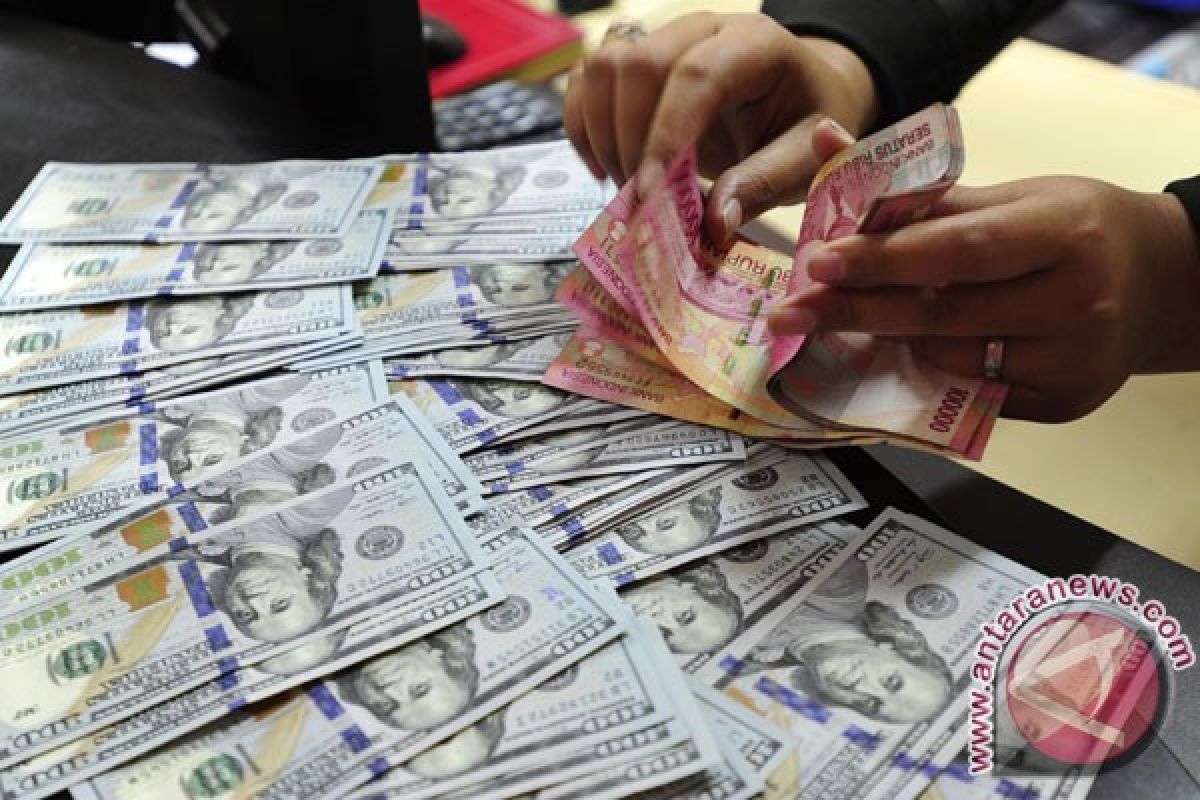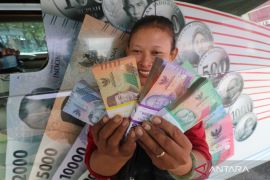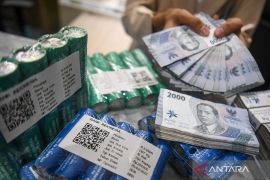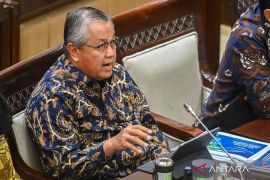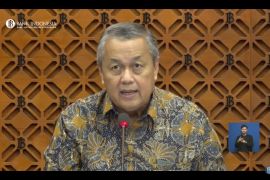Though the rise in fund rate by The Fed was not yet final, the effect had been predicted to be limited."Jakarta (ANTARA News) - The year 2015 has been marked with a long arduous struggle to shore up rupiah to regain some of its lost value against the US dollar.
Long period of uncertainty over the plan of the U.S. central bank, (The Fed) to raise its fund rate brought about negative sentiment for risk currencies including rupiah.
An increase in the Fed fund rate would have impact on investment in the country.
Investors chose to invest in safe currencies resulting in massive capital outflows from the market of developing economies.
In addition, shrinking foreign exchange reserve and trade deficit contributed to weakening rupiah against the dollar.
Based on data at Bank Indonesia, the countrys foreign exchange reserves declined 13.97 percent in the first 11 months of 2015 to US$100.24 billion.
The decline was partly attributable to large spending by the Indonesian central bank in market operation to prop up rupiah.
A decline in the foreign exchange reserves would reduce the strength of the central bank in market intervention to protect rupiah.
Meanwhile, the countrys trade balance in November, 2015 was in the red with deficit at US$0.35 billion. The deficit was caused more by a decline in the exports of commodities other than oil and gas.
The oil and gas trade balance improved with smaller deficit compared to the previous month.
On January 2 in 2015 rupiah traded at the level of 12,387 per dollar, weakening to 13,802 per dollar by 30 December 2015 - or shrinkage of 10.25 percent in the whole year.
"Accumulation of negative sentiments resulted in loss of much of the interest in doing business in the country, and triggered capital outflow," chief researcher of Monex Investindo Futures Ariston Tjendra said here earlier this week.
Ariston said foreign investors held quite large portion of assets in securities in Indonesia - owning around 38 percent of rupiah denominated bonds compared to only around 31 percent in Malaysia and 15 percent in Thailand.
Rupiah stability, therefore, is easily disrupted.
"The high foreign ownership of the bond instrument makes rupiah more vulnerable to being corrected," he said.
The directorate general of risk and financing management of the finance ministry said foreign investors held Rp558.11 trillion worth of state bonds by 29 December, 2015 or around 38.22 percent of total outstanding amount of Rp1,460.43 trillion.
Maintaining stability
Bank Indonesia issued a policy package to maintain rupiah stability on 30 September 2015 to follow the policy package of 9 September, 2015.
Senior Deputy Governor of Bank Indonesia Mirza Adityaswara said the new policy package concerned three pillars - maintaining rupiah stability, strengthening rupiah liquidity management, and redressing the position of foreign exchange supply and demand.
"Synergy between the policies of Bank Indonesia and the government is expected to strengthen macroeconomic stability and Indonesian economic structure including the financial sector, to be more resistant to any external turbulence," Mirza said.
He said rupiah liquidity has been strengthened with the issuance of 3 month Bank Indonesia Deposit Certificate (SDBI) and Reverse Repo SBN (state securities) with two week term.
He said the management of foreign exchange supply and demand is strengthened with a series of policies in the forward market, adding, the policy is to encourage transactions in sales of foreign exchange/rupiah.
Bank Indonesia also sold SBBI in foreign currencies and cut the holding period for SBI (Certificate of Bank Indonesia) from a month to a week to strengthen capital inflows.
Incentive was offered by cutting tax on deposit interest for exporters putting their export earning in Indonesian banks or converting their foreign exchange into rupiah.
The central bank encourages greater transparency and open access to more information on the use of foreign exchange through reports of foreign exchange accounts (LLD).
Therefore, the holders of foreign exchange account are required to submit report of their spending of foreign exchange.
"This stipulation is in line with the Law No.24 of 1999 on foreign exchange account and Exchange Value System in which Bank Indonesia has the authority to ask for information and data about foreign ex change account of the people," Mirza Adityaswara said.
Bank Indonesia Governor Agus Martowardojo said Bank Indonesia had strengthened its position in maintaining financial market stability before the Fed raised its fund rate through cooperation with more central banks of other countries.
Bank Indonesia already had cooperation through bilateral scheme of currency swap agreement (BCSA) with a number of countries including China, which only recently increased BCSA value to US$20 billion from US$15 billion earlier.
One of the goals of the BCSA bis to increase liquidity support between signatories of the agreements.
Bank Indonesia also has taken steps against rupiah weakening and capital flights, through greater prudence in the management of foreign debts, Agus said.
Projection in 2016
In 2016 , the uncertainty and negative sentiment brought about by the policy of The Fed in raising its fund rate has been over. The announcement in mid December, 2015 by the Fed raising its fund rate has ended the long period of uncertainty.
Mandiri Sekuritas economist Leo Rinaldy said the policy of The Red to raise its fund rate for the first time in 10 years did disturb stability in the financial market, but the effect did not last long.
"Though the rise in fund rate by The Fed was not yet final, the effect had been predicted to be limited," he said.
He said the projection in 2016 was based on a number of factors - The Feds policy of raising its fund rate by phases and limited monetary tightening by the United States amid that countrys growing economy and low inflation.
In addition, Indonesia is still among countries offering the most attractive interest rate with lower premium risks among developing economies despite Bank Indonesia pruning its benchmark interest rate (BI rate) by 50 basis points.
Another factor is the countrys macroeconomic fundamental condition is expected to be better in 2016 as a result of the governments aggressive deregulation policy packages.
Fundamentally, the countrys domestic economy in 2016 is predicted to be stronger than in 2015, that rupiah fluctuation would be well under control.
The countrys economy is predicted to grow 5 percent (year on year) in 2016 and 5.4 percent in 2017.
LBP Enterprise analyst Lucky Bayu Purnomo said he was optimistic the series of policy packages of government launched over the past few months would succeed in improving rupiah stability.
The eight policy packages issued by the government marked with the pruning of hundreds of restrictive regulations would be highly appreciated by investors, Lucky said.
He said he hoped the series of the policy package could be implemented immediately to strengthen macroeconomic stability and boost economic growth, he added.
In Batam recently, Home Affairs Minister Tjahyo Kumolo said the government would abolished half of 40,000 restrictive regulations including 5,000 regulations in his ministry.
The minister asked regional administrations to follow the lead in the massive deregulation policy to facilitate investment.
(T.H-ASG/F001)
Reporter: Zubi Mahrofi & A. Saragih
Editor: Priyambodo RH
Copyright © ANTARA 2015
